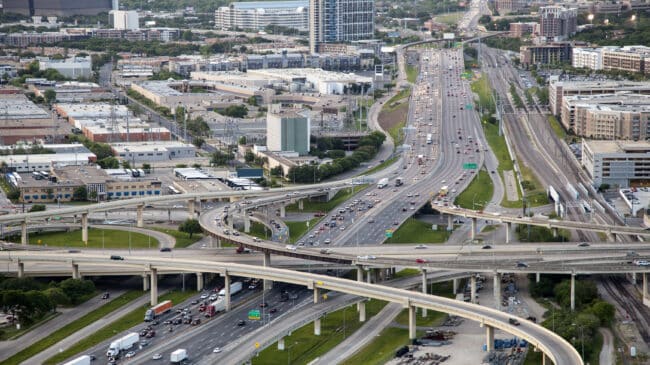With Texas poised for another population boom in new arrivals of people fleeing higher-tax states, improving the state’s congested and inadequate freeways takes on new urgency. Institutional investors, including insurance companies and public pension funds, are seeking good long-term investments. They have raised hundreds of billions of dollars to invest as equity in revenue-producing infrastructure, including highways.
Since 2017, however, the state legislature has let expire the authority for the Texas Department of Transportation (TxDOT) to carry out privately financed public-private partnership (P3) projects. It’s time for conservatives, in particular, to reconsider their opposition to public-private partnerships.
First, there is a huge amount of money ready, willing, and able to invest in U.S. infrastructure. Last year infrastructure investment funds (where insurers and pension funds place their infrastructure money) raised $102 billion, their second-highest annual total ever. And despite the COVID-19 pandemic, the investment funds put $54 billion into new projects last year—but very little of that was in the United States. Most of that money went overseas, for projects in Europe, Latin America, and Asia. That’s because most U.S states do not have workable P3 laws—or refuse to approve projects. Some conservative and purple states, like Florida, Georgia, Indiana, Louisiana, and North Carolina, are among the handful of states actively attracting P3 project investment.
Second, a major benefit of the P3 model is the long-term financing of megaprojects. That means a major project (like the rebuilding of I-35 through Austin, for example) can be financed up-front, so it can be built sooner rather than later, pulling highway user benefits forward.
Moreover, since the winning consortium not only designs and builds but also operates and maintains each project, guaranteed maintenance is assured via the long-term contract. Since the same entity that builds the project must also maintain it, the more durable pavement and bridges will require less ongoing maintenance over their lifetime. This minimizes life-cycle costs, thereby giving the Texas Department of Transportation (TxDOT) and motorists more bang for their bucks.
Third, contrary to what you may hear, these P3 projects engage in extensive subcontracting. For example, for the new express toll lanes on State Highway 288 in Houston, subcontractors accounted for 45 percent of the project budget. Local contractors have extensive local knowledge of how things work (permitting, utility relocation, etc.). And the P3 companies are very conscientious about meeting, and often exceeding, goals for minority and disadvantaged business participation.
Fourth, most P3 highway projects are financed based on new revenues, which would reserve TxDOT funds for numerous other projects around the state. Nearly all the P3 highway projects that Texas metropolitan planning organizations (MPOs) seek to undertake would add express toll lanes to congested freeways (as on I-35 in Austin).
Texas MPOs, like their counterparts in other major metro areas, envision entire networks of express toll lanes. There are already more than 60 express toll lane projects in operation around the country, but Texas—once the leader in them, has been falling behind. Besides providing the revenue stream for these P3 projects, the express lanes’ variable tolls also cut traffic congestion dramatically, giving drivers a welcome alternative to freeway gridlock, especially for time-urgent trips. In other words, these tolls are optional: No one is required to pay them unless they choose to use the new toll lanes.
Public-private partnerships for new, optional toll lanes are a form of users-pay/users-benefit. That is a long-standing conservative principle that Texas conservatives should re-embrace as they reconsider the important role P3s can play in giving Texas a modernized, well-maintained, and funded 21st-century highway system.
This column originally appeared in the Tyler Morning Telegraph.

